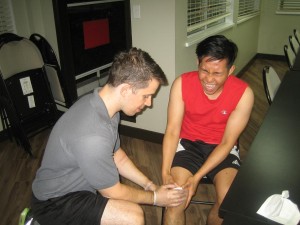A posterior cruciate ligament tear (PCL) is typically seen in cases of serious trauma to the knee structures. This ligament has a vital role in the stability of the knee joint. The PCL along with the ACL prevents the tibia from sliding excessively forward. Additionally, the PCL also keeps the tibia in a position beneath the femur.
The usual mechanism of injury is the “dashboard injury” which occurs if the knee is flexed and an object strongly strikes the shin backward. This is likely to occur during vehicular collisions when the shin forcefully strikes the dashboard.
A posterior cruciate ligament tear also occurs during sports if the individual falls on the front of his/her knee. In this injury, the knee is excessively flexed with the foot pointed downwards, thus stressing the PCL and if the force is strong enough, a tear occurs.
What are the signs?

The usual signs of a posterior cruciate ligament tear include:
- Knee pain
- Swelling
- Diminished movement
- Sensation that the knee is popping or about to give out
Management of a posterior cruciate ligament tear
The initial treatment for the symptoms of posterior cruciate ligament tear such as pain and swelling includes application of ice, crutches and elevation. Once these symptoms have settled, physical therapy is essential in improving the knee strength and movement.
Surgical reconstruction of the posterior cruciate ligament is only suggested for the grade III tears. This procedure is only reserved for individuals who sustained several major knee ligaments or those who could not engage in usual activities due to the continuous knee instability.
More Information / Disclaimer
The information posted on this page on a posterior cruciate ligament tear is for learning purposes only. Learn to recognize the signs and how it is managed by taking a standard first aid course with Toronto First Aid.
